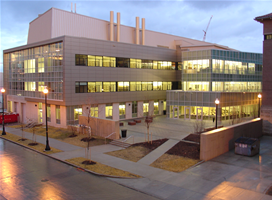Program Orientation
The Ohio State University Cognitive Psychology Program focuses on research into basic cognitive processes in human memory, perception, language, music, motor control, decision making, higher-level processes, and the neurophysiological underpinnings of these processes. Research is also being conducted on aspects of these processes that involve aging, child development, and clinical and neurological deficits. There is a great deal of collaboration between members of the cognitive program and members of other programs in the department (especially with the Quantitative area) and other departments, including the medical school and hospital. Over half the members of our program actively pursue quantitative modeling approaches to these topics. There is a general agreement that it is difficult to understand human cognition without theories that integrate phenomena within a framework that allows quantitative tests of the theories. Faculty web pages (to the right) illustrate the specific research questions currently being addressed.
The laboratories in the Cognitive program have computational resources and systems to conduct behavioral experiments and to perform computational modeling. Individual laboratories have systems that allow data analyses and experiments to be conducted with EEG, eye movements, heart rate variability, and speech perception and production. The department also hosts a center for fMRI brain imaging (described below).
Affiliated Centers
The Center for Cognitive Science
The Center for Cognitive Science at Ohio State connects the departments of psychology, philosophy, computer science, electrical and computer engineering, linguistics, optometry, industrial and systems engineering, and speech and hearing sciences, among others. The Cognitive area plays an active role and our students and faculty benefit from its interdisciplinary courses, seminars, and opportunities for research collaboration. GradCog is a student-led organization that meets regularly to talk about current issues in the field, plans speaker series, and organizes the annual Cogfest, an afternoon-long mini conference with speakers and poster presentations.
Center for Cognitive and Behavioral Brain Imaging
A new center for brain imaging is located in the basement of the psychology building in the Center for Cognitive and Behavioral Brain Imaging (CCBBI). It uses a Siemens 3T Trio magnetic resonance imaging Total Imaging Matrix (TIM) system which is available for structural and functional MRI studies. It is equipped with a state-of-the-art projection system, Eyelink II eye tracker, and an MR compatible high-definition audio system.
Mathematical Biosciences Institute
This institute is designed to bring together scholars from around the world to participate in workshops that deal with current research in mathematical approaches to the biosciences. Faculty in the psychology department participated in a workshop on the systems biology of decision making and there are upcoming workshops on cognitive neuroscience (2012) and brain imaging (2013). MBI programs are designed to reinforce and build upon existing research efforts in the mathematical biosciences, and to inspire and accelerate the expansion of the community and its intellectual growth. These include emphasis-year programs, current topic workshops, education programs, and research projects.
For Graduate Students
The Cognitive Psychology Program trains students to make substantive contributions to basic knowledge in cognitive psychology and cognitive neuroscience. Graduate students develop research and analytical skills while learning to coordinate basic research with theory development and application. Students participate with faculty members in joint research projects investigating such questions as: How do people perform skilled movements? How do they perceive and classify objects, scenes, and events? How do they process language, learn, and remember? What happens in development, aging, and processing disorders? Approaches to these issues include experimental research (both behavioral and neuroimaging) and theoretical modeling. Students typically present findings at professional meetings and publish papers in professional journals.
Program of Study
An individualized study program allows you to complete the master's degree requirements, including the master's thesis, during the first one to two years of study. At the end of the second to third year, after passing the Candidacy Examination, you are admitted to Ph.D. candidacy.
Questions for the Candidacy Examination are based on a reading list that is prepared with the help of the four faculty members who serve on your examination committee. You are expected to spend an additional one to two years completing the Ph.D. dissertation.
Areas of Emphasis
The Cognitive Area encompasses four broad areas and emphasizes laboratory research, brain imaging and EEG measures, and cognitive modeling in each:
- Memory and cognition
- Perception
- Language and speech
- Human performance
You will be expected to sample from each of these broad areas while you pursue topics of most interest to you in greater depth.
For students interested in cognitive modeling, a separate concentration is available in which students take courses in the cognitive and quantitative areas. This concentration encourages individualized courses of study that include courses from outside the psychology department including mathematics, statistics, linguistics, computer science, engineering, etc...
Financial Support
We try to guarantee graduate students admitted in the Cognitive Program at least five years of support beginning with their first year in the program. This includes tuition, fees and a monthly stipend. The assistance is most often in the form of on-campus, departmental employment, such as research assistantships and teaching associateships. In some cases, this support may include one or more years of fellowship support. Students are encouraged to submit their completed applications for admission and financial support by December 15 to be granted full consideration.
Faculty
- Julie Golomb
- Richard J. Jagacinski
- Andrew Leber
- Hsin-Hung Li
- Peter Kvam
- Gail McKoon
- Jay I. Myung
- David Osher
- Alexander Petrov
- Mark A. Pitt
- Roger Ratcliff
- Zeynep Saygin
- Brandon Turner
Affiliated Faculty
- Bennet Givens
- Jasmeet Hayes
- Scott Hayes
- John E. Opfer
- Vladimir Sloutsky
- Julian Thayer
- Trisha Van Zandt
- Laura Wagner
Emeritus Faculty- Retired- no longer accepting undergraduate or graduate students in the lab.
[pdf] — Some links on this page are to PDF files requiring the use of Adobe Reader. If you need these files in a more accessible format, please contact webmaster@www.psy.ohio-state.edu.

